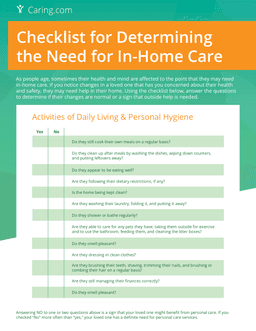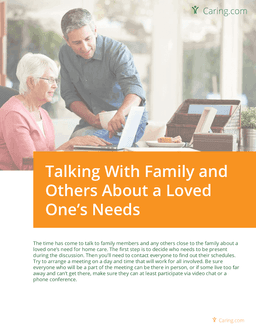The 10 Best Home Care Agencies for Seniors in Brooklyn, NY for 2024
Caring.com offers a free service to help families find senior care and authentic reviews to help you in your decision. On average in Brooklyn, NY, residents and their loved ones rate In Home Care agencies across the 100 options below.
What you can do with Caring
On this page:
Paying for Home Care in Brooklyn, NY
The Cost of Home Care in Brooklyn, NY
In Brooklyn, residents pay approximately $5,148 per month for home care, according to the 2024 Genworth Cost of Care Survey. This aligns with New York's statewide median of $5,148 but falls below Binghamton's rate of $6,673. Meanwhile, prices drop in Buffalo, where seniors pay one of the lowest rates in the state at $4,576.
Brooklyn
$5,148
New York
$5,148
United States
$5,720
Binghamton
$6,673
Albany
$6,292
Rochester
$5,815
Buffalo
$4,576
The Cost of Home Care vs. Other Senior Care Options in Brooklyn
Home care stands out as one of Brooklyn's most affordable care options at $5,148 per month. Seniors requiring medical services from a licensed nurse or therapist to live comfortably pay more for home health care at $6,483. Adult day health care offers a lower monthly rate than home care at $2,275, while assisted living and nursing home services cost more at $6,508 and $12,471, respectively.
Home Care
$5,148
Home Health Care
$6,483
Adult Day Health Care
$2,275
Assisted Living Facility
$6,508
Nursing Home Facility (semi-private room)
$12,471
Note: Data for Brooklyn was unavailable, so data for the nearest city, New York, was used instead.
Financial Assistance for Home Care in Brooklyn, NY
Given the high cost of in-home care, many people use one or more forms of financial assistance to cover the expenses. Below, we explain some of the most common sources of financial help for paying for in-home care. If none of these options are available to you, you can reach out to your Area Agency on Aging or Aging and Disability Resource Center to learn about local resources.
- Long-Term Care Insurance: Long-Term Care Insurance covers expenses related to senior care, including in-home care. Depending on the policy type, beneficiaries may receive a cash payment to use towards long-term care or reimbursement for qualifying long-term care expenses. Note that there are limitations- typically a maximum benefit of $150 per day- and exact coverage terms vary depending on the exact policy, so always check the details.
- Medicare: Medicare does not cover in-home care because it is classified as custodial, or non-medical, care. However, some Medicare Advantage and Medicare Supplement plans, which offer expanded benefits, may cover in-home custodial care.
- Medicaid: Medicaid coverage of in-home care varies between different states because it is not a federally mandated benefit. Currently, all states cover some in-home care either through their standard Medicaid or a waiver program. The specific coverage rules are set individually by each state.
- Veterans’ Benefits: The Aid and Attendance benefit is a monthly cash payment that beneficiaries can use to pay for senior care, including in-home care services. To qualify for A&A, Veterans must already receive the VA pension and meet several additional requirements, including needing assistance with the activities of daily living.Contact the Department of Veterans Affairs to learn more.
- Reverse Mortgages: Home Equity Conversion Mortgages (HECMs) are federally insured loans that are available to homeowners age 62 and over. Reverse mortgages allow you to access a portion of your home’s equity in cash, tax free. Many seniors use reverse mortgages to finance their care expenses, including in-home care. Note that although there are no monthly payments due on reverse mortgage loans, borrowers do have to repay the loan once the last surviving homeowner passes away, moves, or sells the home.
Free & Low-Cost Home Care Resources in Brooklyn, NY
Although living at home is normally the preference of most seniors, it can sometimes present challenges. Fortunately, there are many agencies and organizations that make aging in place affordable, comfortable and safe for Brooklyn’s older citizens.
| Resource | Contact | Service |
|---|---|---|
| NYC Department for the Aging | (212) 244-6469 | The NYC Department of Aging manages multiple resources to support Brooklyn's seniors. They include food assistance programs that can help older citizens get the vitamins, minerals and nutrients vital to their health. The department's medicare specialists can help adults aged 64 and older determine the most appropriate and affordable plans for their long-term health care needs. Additionally, the financial section can discuss burial cost options. |
| Weatherization Assistance Program | (518) 474-5700 | The Weatherization Assistance Program aims to help seniors on low incomes reduce their energy costs and make their homes safer by paying for home improvements that help them use energy more efficiently. It's available to homeowners and renters, although the latter will need the owner's authorization before works can begin. Works can include sealing points of air leakage/intrusion, insulating attics and walls, repairing or replacing doors and windows and fixing underperforming heating systems. |
| Senior Citizen Homeowners' Exemption | 311 | Homeowners aged 65 and older with incomes not exceeding its guidelines can apply for the Senior Citizen Homeowners' Exemption. It can lessen tax burdens by reducing the taxable value of their homes. The reduction in the assessed value is determined by the total household income and ranges from 5-50%. The applicant's location per the area's school district also factors into the assessment. Seniors can only apply for one property only and it must be their primary residence. |
| Home Energy Assistance Program | (212) 331-3126 | The program helps renters and homeowners with qualifying low incomes pay their heating and utility bills. The program also provides immediate help in emergencies, such as a disconnect notice from a vital utility such as electricity. Some seniors automatically qualify for assistance, such as SSI recipients living alone. The Utility Assistance Program is similar, although its purpose is to help seniors in neglected or unsafe homes. Some recipients may also be eligible for a cash grant. |
Determining Your Loved One’s Need for In-Home Care
Aging can be a difficult process, and loved ones may not always ask for help – oftentimes it’s up to their family to evaluate their need for help around the house. While no two situations are exactly alike, this checklist can help you and your loved ones determine when it’s time to start the search for a home care provider.


Guidelines for Talking About In-Home Care
If you’ve determined that your loved one needs the assistance of a care provider in their home, it may be time for a difficult conversation. Handled correctly, however, this process can bring a family together and ensure that everyone’s concerns are addressed. Use this PDF as a starting point to help the conversation stay as positive and productive as possible.

